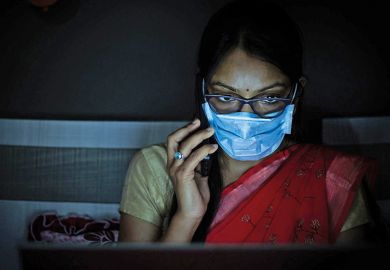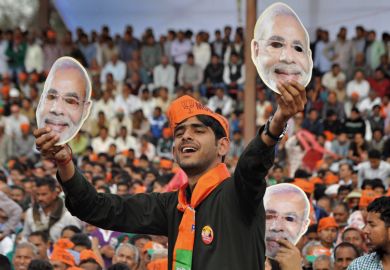India is seeing a reversal of the proliferation in low-quality engineering degrees – but meanwhile, more online players are seeking to make money off shoddy courses, academics say.
In India, where universities have multiplied at a ferocious pace amid high demand, for-profit degree providers with little consideration for quality education have thrived for decades. But recently, the tide looks to be turning, scholars believe.
Saikat Majumdar, a professor of English and creative writing at Ashoka University, said the phenomenon is likely due to “profit seekers” going “overboard” with professional institutes – especially engineering programmes – resulting in graduates failing to get jobs. Since these ill-prepared students have hit the workforce, many of their institutions have been losing applicants and closing down, he said.
But at the same time, for-profit players have found a new opening in the digital sphere.
“Since the pandemic, this mushrooming [of low-quality degrees] has started to happen in spaces of virtual and long-distance learning, including training modules for employed professionals. The factories, in other words, are beginning to transition from physical to virtual avatars,” Professor Majumdar said.
He said that institutions offering low-quality degrees are “no longer” limited to engineering alone. Fields including management and hospitality training have become new targets. Still, he said that medical training has so far remained free of the problem, likely because it is strictly monitored by the government.
Saumen Chattopadhyay, a professor at the Zakir Husain Centre for Educational Studies at Jawaharlal Nehru University, attributed engineering school closures to several factors.
“Students have become a bit more aware. Regulatory interventions have come better. The spread of media and rising demand have helped them maintain quality,” he said.
He also noted a better support system in southern and western Indian states, but added that there’s a “wide variation” in quality across them.
Gautam Menon, director of the Centre for Climate Change and Sustainability at Ashoka, said that there was also a proliferation of private centres coaching students to train for competitive exams such as those needed to enter into India’s prestigious Indian Institutes of Technology and into medical schools.
“The business of coaching classes is booming. It has been joined by big players who are riding on a trend towards learning delivery by electronic means,” he said.
Professor Menon too was critical of Indian institutions that prioritised churning out degrees over teaching a “modern understanding of the subject [and] its pedagogy”.
“This inability to remain current is a reflection of the fact that they see their role as being primarily degree providers and not educators,” he said.
While Professor Menon agreed with the need to hold institutions to higher standards, he cautioned against using more regulation to solve the problem.
“We do need more institutions overall, both private and publicly funded. We need to provide more autonomy to public institutions,” he said.
Register to continue
Why register?
- Registration is free and only takes a moment
- Once registered, you can read 3 articles a month
- Sign up for our newsletter
Subscribe
Or subscribe for unlimited access to:
- Unlimited access to news, views, insights & reviews
- Digital editions
- Digital access to THE’s university and college rankings analysis
Already registered or a current subscriber?








